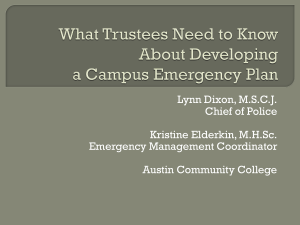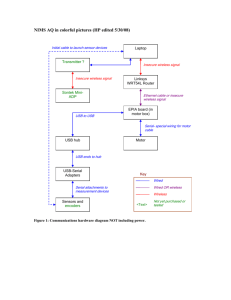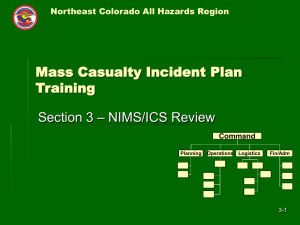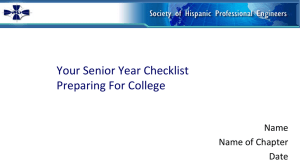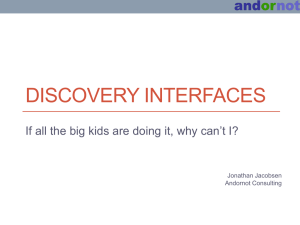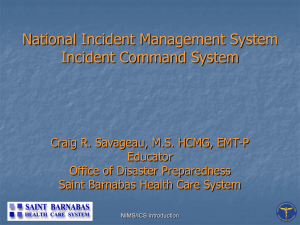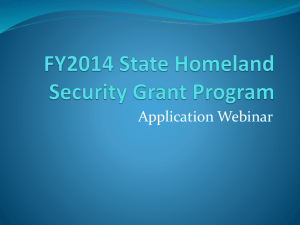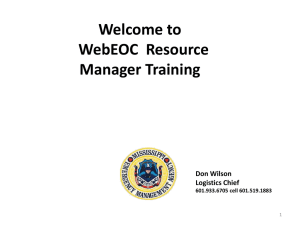Texas Division of Emergency Management
advertisement
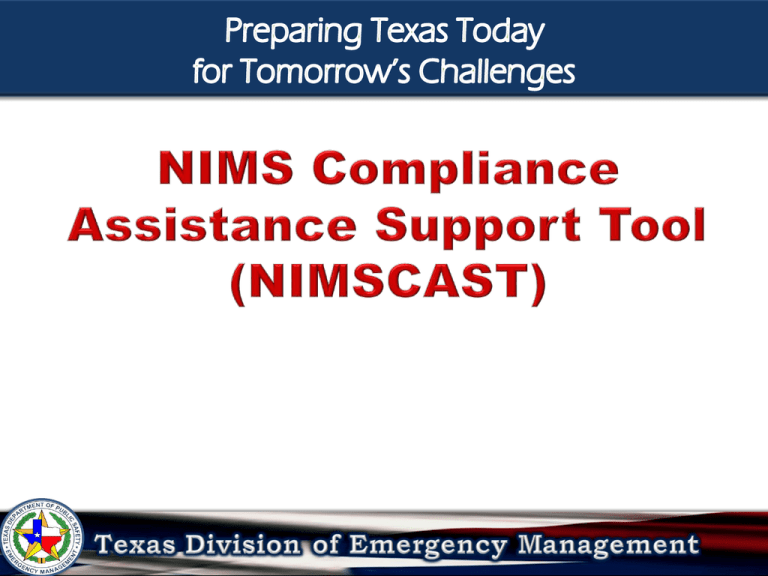
Provide an overview of NIMS Compliance Assistance Support Tool (NIMSCAST) features and capability. Review current participation by States and Territories, Locals, and Tribal Nations Audit guidance Enables State, Local, and Tribal jurisdictions to self-assess Timeline: 1/2005: Initial NIMSCAST software released 4/2007: FY2007 - 29 Implementation Objectives 6/2008: FY2008 - 27 Implementation Objectives 4/2009: FY2009 - 28 Implementation Objectives NIMSCAST is currently available on the FEMA website at www.fema.gov/nimscast. Accounts are Jurisdiction Based Assessment Data is tied to Account, not the user Users can be removed and reassigned Data remains in system Hierarchical Account Organization FEMA Region State COG County City Department or Organization Permission defines relationship to account Administrator Adds, Edits, Deletes user permissions; controls access Rolls-up assessments Creates Sub accounts Saves/edits response to questions Permission defines relationship to account Standard- Saves/Edits response questions Read Only - view assessments response via reports Read Only with Inheritance - on hierarchy starting at account granted Sample Implementation Activity User e-mail address acts as unique ID Demo www.fema.gov/nimscast Assessments Summary/Comprehensive Corrective Action Plans Implementation Objective Progress Surviving an Audit First DON’T PANIC we are here for you! Next review the NIMSCAST audit Toolkit. This Toolkit contains everything you will need to survive your audit. This toolkit provides planning guidance that can be incorporated into existing NIMS implementation plans to meet NIMS and NIMSCAST regulations. This toolkit is designed to provide emergency management professionals basic information about NIMS implementation and compliance. The Checklist Adoption Planning Training Exercise Communications Information Management Resource Management Incident Command System Multi-Agency Coordination Public Information System The Checklist Adoption Adopt the National Incident Management System (NIMS) Designate and maintain a single point of contact Ensure that Federal Preparedness Awards to State/Local Departments/Agencies support all required NIMS compliance objectives Audit agencies and review organizations should routinely include NIMS compliance requirements in all audits The Checklist Planning Revise and update plans Participate in and promote interagency mutual-aid and assistance agreements Include preparedness organizations and elected and appointed officials in the development of emergency operations plans Make sure functional needs and whole community information is covered in all plans The Checklist Training Complete Awareness Training courses IS-700: NIMS: An Introduction, ICS-100 Introduction to ICS, ICS-200 Complete Intermediate ICS 300 course or equivalent, for all appropriate mid-management personnel Complete the Advanced ICS 400 course or equivalent, for all appropriate senior level personnel Complete the Awareness IS-800.B: National Response Framework Training records are on file of all training NIMS Training The Checklist Exercise Incorporate NIMS/ICS into internal and external local, regional, and state emergency management training and exercises Plan for and/or participate in an all-hazards exercise program Plan for and/or participate in an all-hazards exercise program Incorporate corrective actions Records are on file of all exercises with corrective action plans The Checklist Communications Information Management Apply common and consistent terminology Utilize systems, tools, and processes to present consistent and accurate information The Checklist Resource Management Inventory response assets to conform to NIMS National Resource Typing Definitions http://www.fema.gov/emergency/nims/ Ensure interoperability Utilize response asset inventory for intrastate/interstate mutual aid requests Credentialing The Checklist Resource Management Resource Management Resource Typing Resource typing is categorizing, by capability, the resources requested, deployed, and used in incidents. Measurable standards identifying resource capabilities and performance levels serve as the basis for categories. Resource users at all levels use these standards to identify and inventory resources. Resource kinds may be divided into subcategories to define more precisely the capabilities needed to meet specific requirements. Tier 1 Resource Typing Definitions: Animal Health Emergency [5/05] (PDF 1.8MB, TXT 20KB) Emergency Medical Services (EMS) [3/09] (PDF 2.0MB, TXT 43KB) Fire and Hazardous Materials [7/05] (PDF 192KB, TXT 37KB) Incident Management (IM) [7/05] (PDF 2MB, TXT 56KB) Law Enforcement [7/07] (PDF 291KB, TXT 37KB) Mass Care (Coming Soon) Medical and Public Health [3/08] (PDF 462KB, TXT 29KB) Pathfinder Task Forces [5/07] (PDF 31KB, TXT 6KB) Public Works (PW) [5/05] (PDF 2.8MB, TXT 101KB) Search and Rescue (SAR) [11/05] (PDF 235KB, TXT 66KB) Resource Management The Checklist ICS Manage all incidents/ planned events in accordance with ICS organizational structures, doctrine and procedures. The Checklist Multi-Agency Coordination Coordinate and support emergency management and incident response objectives through the development and use of integrated MACS The Checklist Public Information Systems Institutionalize, within the framework of ICS, Public Information and Joint Information Ensure that Public Information procedures and processes can gather, verify, coordinate, and disseminate information during an incident/planned event. NIMSCAST Point of Contact Melanie Moss – Planner II 512-424-7054 Melanie.Moss@DPS.Texas.Gov Gabriela Stermolle– Planner II 512-424-5989 Gabriela.Stermolle@DPS.Texas.Gov
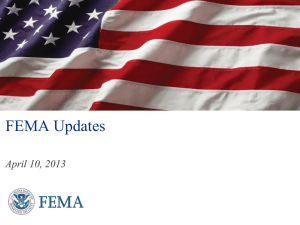

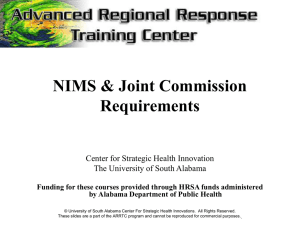
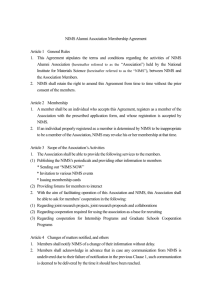
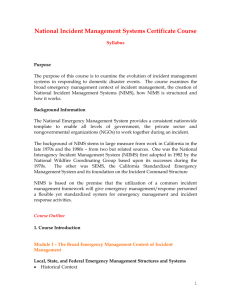
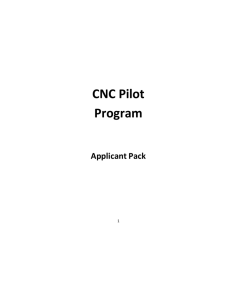
![NIMS Policy & Procedure for [Department]](http://s3.studylib.net/store/data/009720266_1-2e5dcd3fa4e718a22b719f65800c6421-300x300.png)
